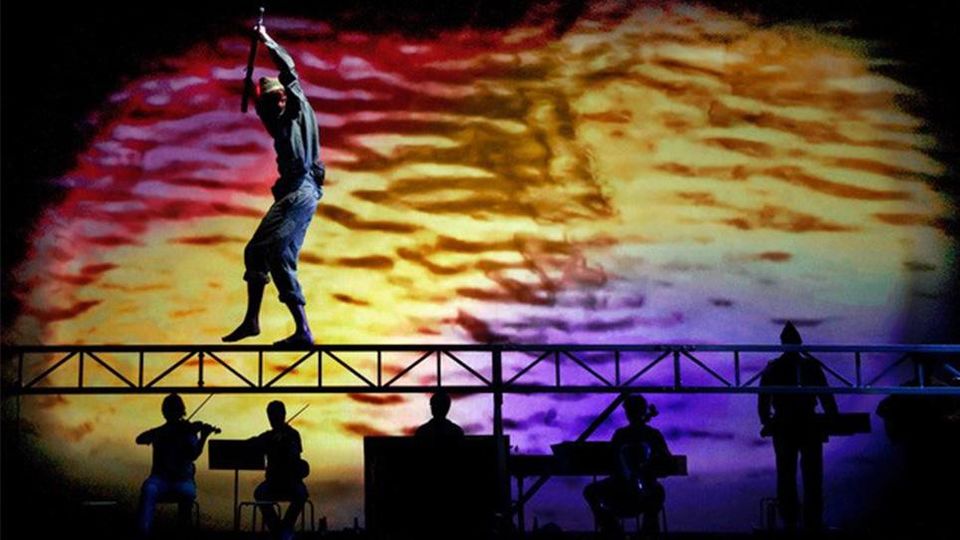Staging Difficult Pasts

About the project
In Memoriam (Dir. Lluís Pasqual, Teatre Lliure, 2018)
Bryce Lease (Royal Holloway, PI), Maria Delgado (The Royal Central School of Speech and Drama, CI), Michal Kobialka (CI), Cecilia Sosa (RA)
This AHRC-funded project (2018-21) examines how theatres and museums are currently shaping public memory of difficult pasts through their staging of narratives and objects. Engaging directly with research partners and major cultural institutions, the project is a collaboration among the Department of Drama, Theatre and Dance at Royal Holloway, University of London, The Royal Central School of Speech and Drama, University of London, University of Minnesota, Cricoteka, Centre for the Documentation of the Art of Tadeusz Kantor (Kraków), Lluís Pasqual and El Solar (Spain), ESMA Museum and Teatro Cervantes (Buenos Aires), Holocaust Research Institute, Jewish Museum London and the Imperial War Museum.
Over the past few decades widespread attempts to expose or reinterpret public memory – which some scholars have called a ‘memory boom’ and others a ‘memory crisis’ – have been determined and shaped in theatres and museums, where formerly taboo historical narratives of difficult pasts have come to public concern for live audiences. Public memory is hotly contested because it is crucial to the construction of identity on national, cultural and individual levels. Attending to Jeffrey K. Olick’s critique of current limitations of memory studies, which he claims has made ‘slow headway’ conceptually and methodologically due to a lack of ‘cross-case’ (cultural, linguistic and disciplinary) connections, this project is timely in its assessment of key debates that have been limited to national frameworks. We will consider how identitarian myths are given dramatic shape or are performatively confronted by theatre makers and curators primarily through narrative (a spoken or written account of connected events) and object (material things). Staging difficult pasts, theatre makers have innovated narrative forms and reframed theatrical and artefactual objects, while museums have increasingly privileged the staging of historical narratives over the display of objects, producing performative encounters as their primary object. Thus, the project’s focus on narrative and object highlights key points of intersection between theatres and museums. While we have delineated between these in the research questions, we understand narratives and objects to be significantly enmeshed and mutually generative.
Research Questions
- How are contemporary theatre makers and museum curators staging historical narratives of difficult pasts? How do their approaches to “staging” narrative overlap? How do they produce common, relational or shared histories? How do these narratives activate spectators concerning historical agency?
- How might comparisons between theatre and museal practices offer new insights into the role objects play in generating and representing difficult pasts? What are the implications of staged narrative replacing objects as the backbone of museum exhibitions and encounters?
- What points of overlap, comparison and contrast among these constructions of history and memory of the Holocaust, authoritarianism, fascism and communism might offer an expanded understanding of difficult pasts in these international cultural contexts?
For further details, see https://www.stagingdifficultpasts.org/
As result of Staging Difficult Pasts, Bryce Lease was invited to join as a Collaborator on the project ‘Thinking Through the Museum: A Partnership Approach to Curating Difficult Knowledge in Public’, working specifically in the ‘National Heritage and Traumatic Memory’ research group. The project runs from 2021-28 and is led by Erica Lehrer (Concordia) and is funded by the Social Science and Humanities Research Council of Canada. TTTM brings together international scholars, students, museum professionals, and community representatives from 20 museums, universities, and NGOs in Canada, the Netherlands, Poland, South Africa, and the US. The team will work within museum settings to co-produce exhibitions and design tools to challenge elite institutional knowledge systems, and beyond their walls to explore alternative heritage mobilization in festivals, grassroots archives, and site-based curating, where communities can set their own agendas.
The project website: https://www.thinkingthroughthemuseum.org/
Grant Reference: AH/R006849/1

